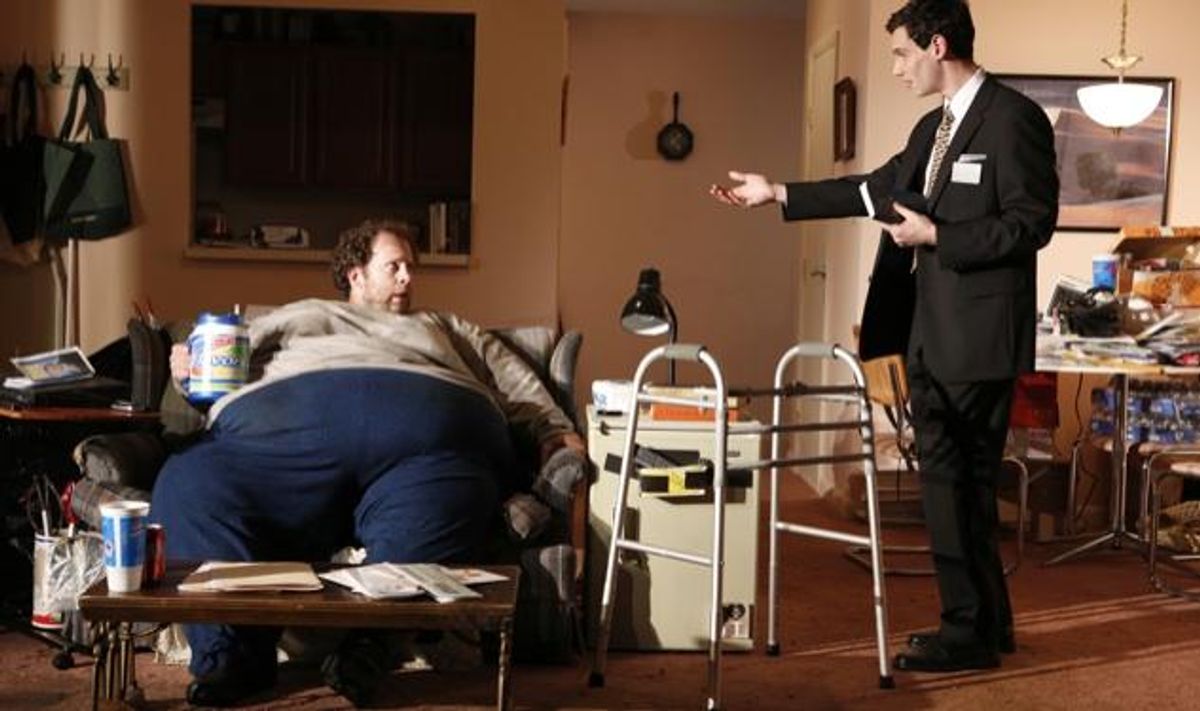Theater & Dance
Swallowed by 'The Whale'

Samuel D. Hunter's play is one of the most original and moving works about a gay man's experience in recent memory
November 07 2012 7:47 AM EST
February 05 2015 9:27 PM EST
jerryportwood
By continuing to use our site, you agree to our Private Policy and Terms of Use.

Photo by Joan Marcus
In the pantheon of gay characters that have appeared on stage and screen, Charlie, the protagonist in Samuel D. Hunter's play The Whale, has got to be one of the most distinctive. When the lights go up on stage, we're confronted with a 600-pound slob on a sagging couch in a crummy apartment who sweats and groans and lurches (when he even tries to move).
Although you'd think such a fleshy character would be neutered, soon enough he's seen masturbating to Internet porn at his computer. That's after he's teaching expository writing about The Great Gatsby to his online students. He's one of the strangest gay characters any writer has ever presented to a mass audience. It's also one of the most emotionally moving, intellectually engaging, and well-constructed plays I've seen in recent memory. You won't forget these characters anytime soon.
The fact that Charlie's played by the actor Shuler Hensley, a big guy in his own right, in the current Playwrights Horizons production, is one of the reasons the play is so successful. He keeps Charlie from ever seeming too dumb, too disgusting, or too pathetic. We learn about the loss of his partner Charlie remains a fascinating character as the women in his life--and one confused Mormon missionary--enter into his orbit, sometimes colliding, sometimes just nearly missing his rotundity.
Hunter, who is also gay, says he wasn't interested creating a play about gayness or obesity. It's a play about the struggles to connect in 21st century America. As Hunter explains, while he did some research into obesity, he didn't want to focus on too many of the ideas of addiction or ways to label it.
"I wanted it to remain idosyncratic," he says. "All the reasons for people gaining this amount of weight are idiosyncratic. But you do say, 'Goddamit, stop giving him those meatball subs,'" referring to the nurse Liz, a caretaker and friend to Charlie, who is conflicted by trying to help but also a quasi-enabler.
And don't think Hunter's just jumping on the bandwagon when it comes to the trend of seeing Mormon characters showing up in creative works. The character of Elder Thomas (played by Cory Michael Smith, last seen in Cock) is a convenient way of making the play even more American, according to Hunter. "It's America's only native religion," he says. "Plus, it's very helpful that they go door to door." Plus we learn that Charlie lost his partner, Alan, after the Mormon church destroyed him in some mysterious fashion until he withered away.
As it turns out, Hunter is originally from Idaho (a bastion of Mormonism) and has written about religion in most of his plays. (He now lives in New York City and also married his husband John Baker, a dramaturge who is also the literary manager of the Wooly Mammoth theater in D.C. this past August.) For this play, Hunter did seek a level of unexpected deification when it came to the central character.
"What I wanted him to be, in the best possible circumstance, is an apotheosis," Hunter explains. "I wanted an emotional and physical experience that points to something divine. But I'm constantly intersted in the divine bumping up against the daily and the banal. There is an experience of the divine in the play, but I try to keep it very quotidian."
And as I sat in the audience after the play's final moments, I certainly felt wrecked by the sublime level of emotional agony.
The Whale continues through December 9 at Playwrights Horizons, 416 W. 42nd St.
Beware of the Straightors: 'The Traitors' bros vs. the women and gays